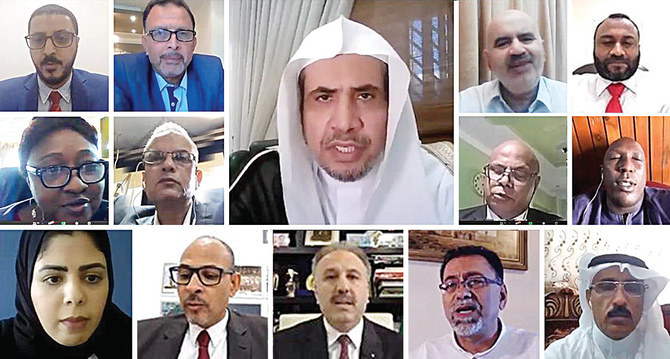RIYADH: Saudi Arabia holds significant potential for quantum research, according to experts.
Celebrating 100 years since the initial development of quantum mechanics, the Kingdom’s Centre for the Fourth Industrial Revolution hosted World Quantum Day for the second time at King Abdulaziz City for Science and Technology in Riyadh.
Ahmed Abdul Majeed, a recent physics graduate originally from Nigeria, told Arab News that Monday’s conference gave him the platform to further explore his passions in quantum science.
“During my third year as an undergraduate I grew this sudden interest in quantum … since then, everything about me revolves around quantum,” he said.
The first World Quantum Day was in 2021 as an effort to promote understanding of quantum science, which deals with miniscule particles smaller than atoms and has the potential to revolutionize computing power.
The KACST event hosted numerous industry experts including David E. Keyes, senior associate to the president for strategic projects at King Abdullah University of Science and Technology.
A longtime admirer of Keyes’ work, Abdul Majeed has been working with him for more than a year at the Quantum Computing Reading Group at KAUST, a group of academics and interested individuals that regularly gathers to discuss the latest developments in quantum computing and often invites companies abroad to join the conversation.
Operating for two years now, the reading group at KAUST is trying to introduce quantum science to more university courses in the Kingdom.
“I know Saudi is working towards (quantum research) and I believe they will achieve more than any other country,” Abdul Majeed said.
Richard Schoebel, regional director at ID Quantique, a Swiss company that develops quantum safe cybersecurity solutions, told Arab News that the Kingdom has made significant strides over the past couple of years in the field.
“We finally see there’s a lot of movement happening in the terms of quantum here in the region. When I look back a couple years ago … it was really very slow, but now you see it’s picking up pace … and it’s getting a lot of traction.”
Schoebel said that it is important to push quantum research forward because it is “the next big thing.”
Quantum computing is going to change the world as we know it, and together with AI it opens new possibilities, he said.
On the other hand, as quantum technology develops it has the potential to bypass traditional cybersecurity methods, making it essential to develop more secure practices.
With such a large number of young people in STEM fields with strong educational backgrounds, there is a lot of space for quantum to reach its full potential here, he said.
Abdul Majeed, having recently been accepted to undertake a graduate degree in quantum technology at the University of Sussex, told Arab News that he has big dreams of taking the education and experiences he gained back home and establishing a school to teach others, as well as creating his own start-up and partnering with other industry leaders.
“I want to do my PhD also; I really want to get to the peak of learning.”
Quoting Nobel Prize in Physics winner Richard Feynman, Abdul Majeed said: “If you think you understand quantum mechanics, you don’t understand quantum mechanics.”
World Quantum Day featured experts from 65 countries who spoke and discussed various topics in quantum science including global strategies for technology development, real-world applications of quantum solutions, bridging academia and industry, Quantum AI, and more.




























